Van Garderen decision remains controversial with Tour of California peloton
Astana protests race jury's decision to preserve van Garderen's race lead
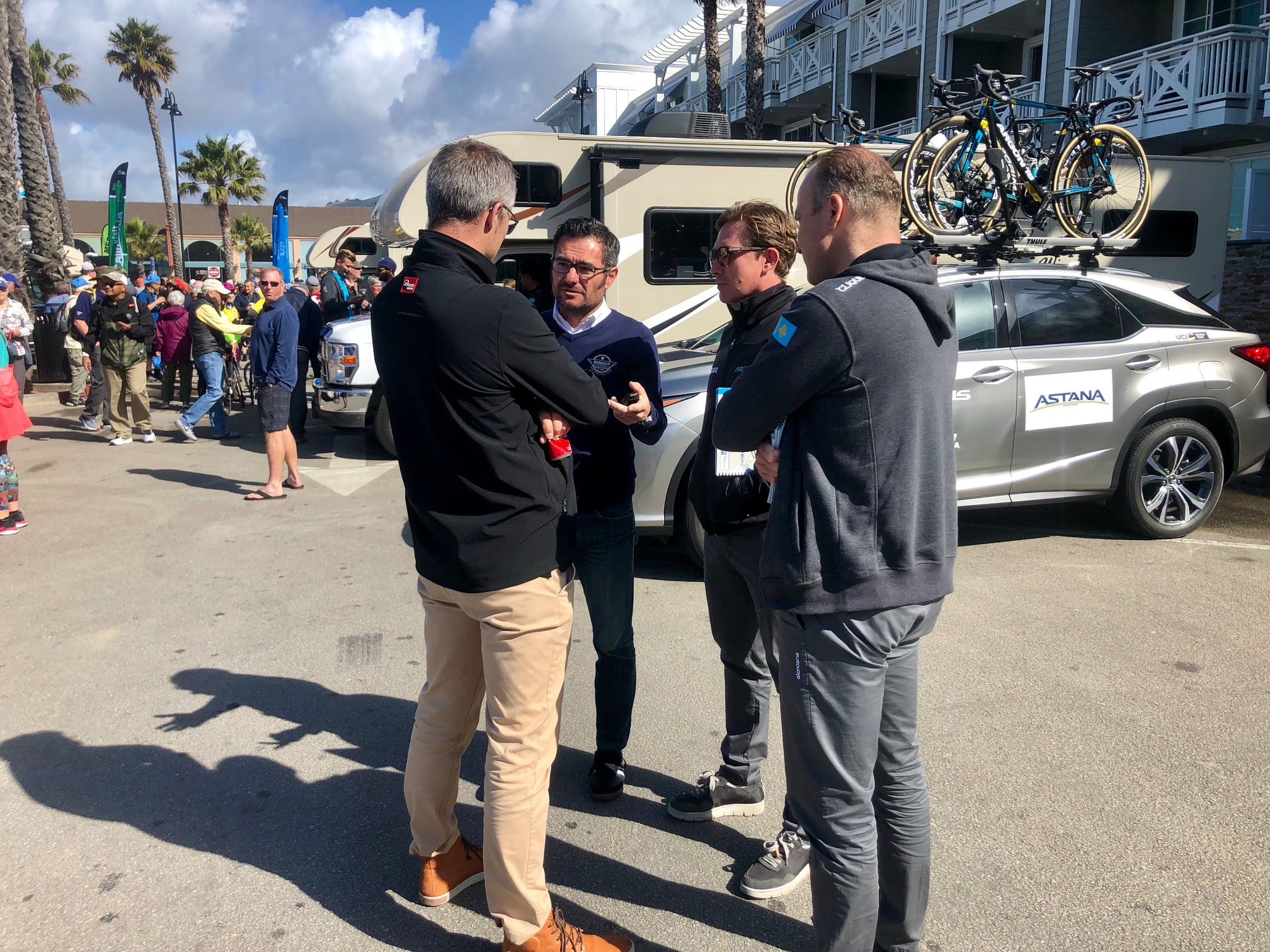
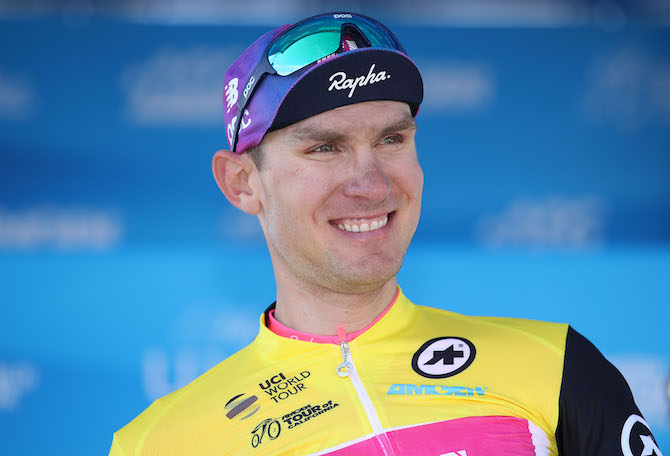
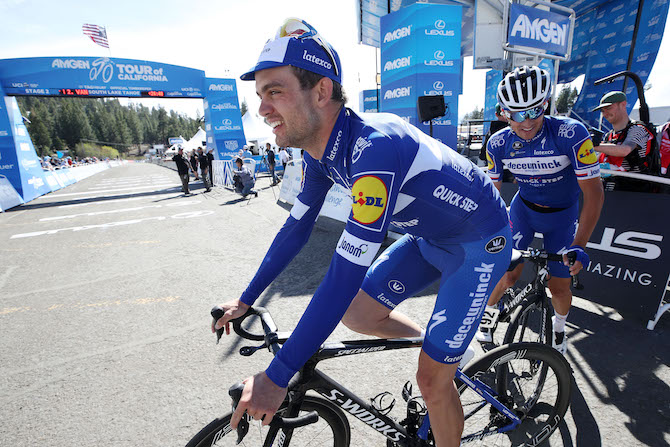
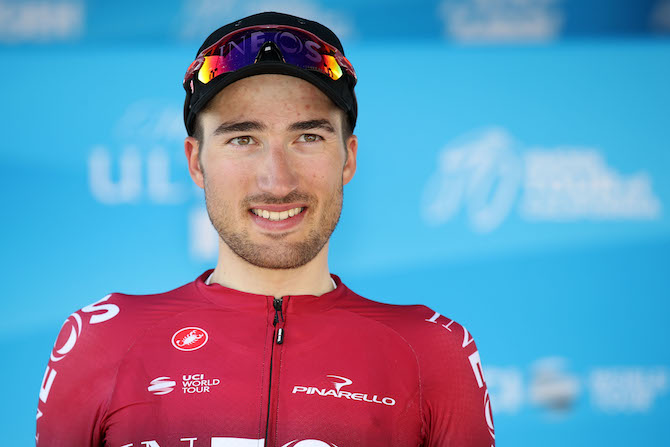
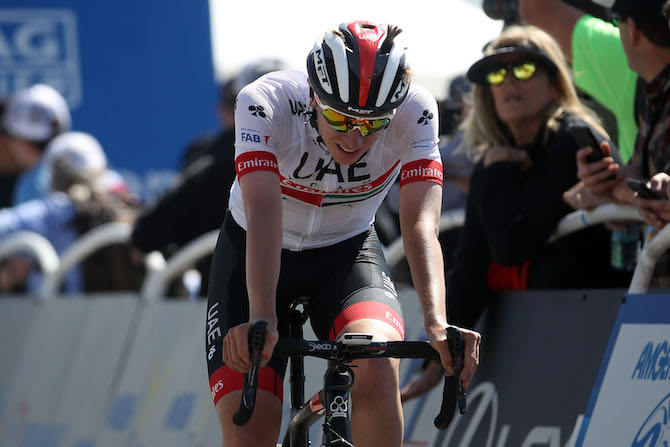
The Amgen Tour of California continues to roil in controversy after the race jury's decision to give Tejay van Garderen (EF Education First) the same time as the lead group at the end of stage 4 despite finishing the race nearly a minute down, having been delayed by a crash outside the 3km mark while chasing back from a mechanical.
Tour of California: Jakobsen wins stage 4 as van Garderen crashes
Late crash nearly derails van Garderen's Tour of California hopes
Tour of California: Van Garderen recovers from crash to retain race lead after stage 4 – Video
Lefevere slams 'incompetent' Tour of California race jury after van Garderen decision
Jakobsen wins Tour of California stage on tubeless tyres
If the initial results had stood, van Garderen would have been in 13th place overall, with stage 2 winner Kasper Asgreen (Deceuninck-QuickStep) moving into the lead and Tadej Pogacar (UAE team Emirates) claiming second after overnight runner-up Gianni Moscon (team Ineos) went down in a crash at 3.2km and also lost time.
The melee began around 7km from the finish when van Garderen, riding near the middle of the bunch, suffered a mechanical. He grabbed teammate Lachlan Morton's bike and started chasing, only to miss a turn because of a mix-up with the brakes on his teammate's bike.
Van Garderen briefly rode off course before turning around and getting back on track. His team dropped back to help the race leader regain contact, but an earlier crash in the peloton with about 3.2km impeded his return. He finished the stage 51 seconds down and dropped 12 places out of the lead.
Confusion reigned in the team parking lot as the race jury made its decision.
"I was as confused as everyone else," van Garderen said Thursday morning before the stage 5 start in Pismo Beach.
"When I crossed the line, I went straight to my bus, and as I was showering they said, 'You need to hurry up because you need to go to the podium. You still have the jersey.' Then, before I even got out of the shower, they came in again and said, 'Actually they've changed their mind.' I was thinking, 'All right.' Then as I was getting dressed, they said, 'No, you're back in yellow.'
The latest race content, interviews, features, reviews and expert buying guides, direct to your inbox!
"We didn't launch any protest or anything. We were just waiting on their decision. They just kept changing their mind, but ultimately they ruled in our favour."
Astana files protest
Astana, which has Jonas Gregaard in seventh place overall, filed an official protest with the UCI over the jury's decision, arguing that van Garderen was not in contact with the main bunch when the second crash occurred and should not have been given the same time as the winner.
"The decision by the commissaires to put everyone on the same time, if we look at the question of whether van Garderen was there or not there, the big crash in the bunch happened without van Garderen, without impacting the race," Astana director Dmitriy Fofonov told Cyclingnews.
"It has happened for my team, for other teams, and we respect completely all the movement [not to penalise the riders who crashed at 3.2km]. So, for that, we are not protesting, but in the moment, when we see 3km and van Garderen was not in the bunch but they put him in the same time, that we do not agree with."
Fofonov said the Astana protest had more to do with respect for the rules than trying to gain from van Garderen's mishap
"The UCI rules should be the same for everyone, whether it's an American guy or a Khazak guy," Fofonov said. "I'm not going to say today that we are going to win the Tour of California, but for some young riders, and also for the future of cycling, we need to respect and fight for their position there."
Deceuninck-QuickStep plan foiled by officials
Deceuninck-QuickStep was perhaps the biggest loser in Wednesday's decision, with Asgreen missing out on the yellow jersey he would have put on had the initial results stood. The 24-year-old Dane started the day third overall, seven seconds behind van Garderen and one second behind Moscon.
Team director Wilfried Peeters told Cyclingnews his team had planned to use the technical final kilometres of stage 4 to try and move Asgreen back into the lead, even if the stage 6 climb to Mt. Baldy may be slightly beyond his skillset.
"I spoke with the commissaire about van Garderen not being back in the bunch," Peeters said. "I understand the position of the 3k rules. Whether the 3k rule is 3.2k or 3k rule, I understand the position when there is a question. But van Garderen was not back in the bunch. He was on car number 6. And then he needed to stop, and he gets the jersey.
"We know this final, and we know it from two years ago, and we said to Kasper, ‘OK, there comes some gaps, sure, on a hard final, hard to control and if there is a gap of 10 seconds we can take the jersey.'
"That was the first goal," Peeters said. "For that, we changed the position of the sprint also. He took the last corner in the first position. In the end, we took the jersey, and in the end, we had to give it away. It was not a good decision.
"We are 100 per cent clear that Kapser is not one of the big favourites," Peeters said. "Baldy is a hard stage, and I know this; it's more for climbers. So for me, this is about respect."
Asgreen, the rider who lost out on yellow, declined to comment when Cyclingnews asked him about the jury's decision.
Mixed emotions for other teams
UAE Team Emirates was also one of the teams that lost out because of the jury's decision. Pogacar would have moved into second, dramatically improving his position to challenge for the win. He's currently back in fourth at 16 seconds.
"The team has got mixed feeling about that, I suppose," director Neil Stephens told Cyclingnews. "I really feel sorry for Tejay. His team did a great job trying to get back. They weren't quite back on the bunch at 3 - whatever it was - kilometres to go. One side of me thinks it's really unfortunate when a result of the race is based on a crash or mechanical. So on that side, I feel really sad for Tejay and his team.
"The other side is that I think it was not a clear decision from the UCI," Stephens said. "Tejay, you could see it in the video, that he wasn't actually in the bunch and it wasn't within 3km, and so the rule wasn't that clear. I think it's a shame, because the image of cycling was damaged yesterday and you can see on pages like Cyclingnews the comments from people, saying that this is a farce, this is criminal, this is a joke.
"And it's not. Cycling is not a joke, it's a serious business and we need to be serious about our decisions," Stephens said. "As far as us, we'll just go about our business the way we thought. We're fourth today, we were fourth yesterday, and had we been second, we would have run the race a little bit differently, but we were fourth. We're really looking forward to tomorrow's stage, and we're really looking forward to racing hard."
Rally UHC performance manager Jonas Carney has Rob Britton is sixth place at the moment, and Britton would have benefited from a tighter reading of the rules. But Carney also expressed mixed emotions about the jury decision.
"The officials were faced with a crazy, difficult decision with that huge crash right at 3km there," Carney told Cyclingnews. "But the Tejay thing being a separate incident, I was surprised they did what they did on Tejay. Obviously, we don't want to move up on GC because somebody had a crash.
"My only concern is that we would like to see that the rules are the rules, and the rules are enforced, and that everybody knows what the rules are," Carney said. "I've been to a lot of races where my riders have had mishaps outside of 3k and there's been no exception made. Yesterday there was an exception made, so nothing at all against Tejay, but we just want to know what the rules are, and we want the rules to be enforced as they're written and equally so that we know what to expect."
Team Ineos director Oliver Cookson, whose rider Moscon also benefited from the jury's ruling, chose his words carefully as he addressed the issue to Cyclingnews.
"It was chaos at the finish," Cookson said. "We were in the second car, and we came back to that crash, obviously Gianni had moved on and de la Cruz had broken his bike, so we ended up swapping for a different bike, etc.
"In the race, we weren't sure where we parked and where the crash was, but yeah, afterward it all becomes clear. We were ready to act as per normal when we saw the first results. We knew that Gianni had lost time. We weren't sure how much exactly, and we wanted to work it out because he was on Rosa's bike, so we weren't sure if that initial one on the race was true or not. We were ready to act as if normal proceedings.
"I think, as a team, we were ready to act as if it was gonna be the normal proceedings. It's played in some riders' favours and others not, and I think in other races it might have been done differently. It's very, very difficult."
The jury's decision was not "very, very difficult" in the eyes of Fofonov. The Astana director's opinion was considerably more clear cut.
"Respect for van Garderen, and tomorrow if he wins by 20-30 seconds, no problem, but imagine tomorrow some rider loses by a few seconds the Tour of California, what happens after that. It's not only me, we saw this discussion around the world, it's a disaster if it's just decision for the sport or not. For us, it's not a just decision.
"I repeat again, it's not especially about the impact on the race, the protest is about the decision," Fofonov said. "If some rider finishes Tour of California and loses by one second to him, we will come back to this discussion. What is the problem? Is it an American problem, decision problem, and we start again, and we start again, and we start again like a washing machine going around."
Growing up in Missoula, Montana, Pat competed in his first bike race in 1985 at Flathead Lake. He studied English and journalism at the University of Oregon and has covered North American cycling extensively since 2009, as well as racing and teams in Europe and South America. Pat currently lives in the US outside of Portland, Oregon, with his imaginary dog Rusty.
